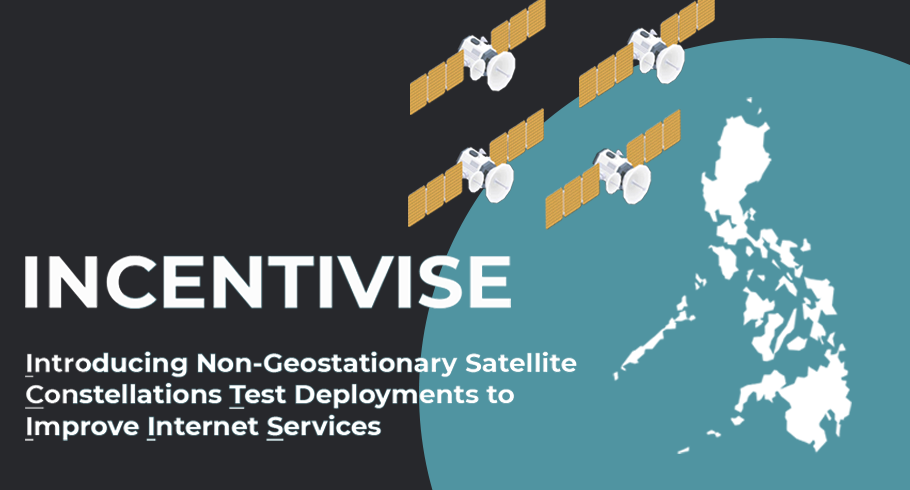The Philippine Space Agency (PhilSA) has accepted the proposal of OneWeb to test their satellite Internet services in select remote and rural areas across the country under the INCENTIVISE project. Through INCENTIVISE, which stands for “Introducing Non-Geostationary Satellite Constellations Test Deployments to Improve Internet Service,” OneWeb is provided an opportunity to test and demonstrate, on a temporary and non-commercial basis, the high throughput and low latency capability of their satellite broadband constellation.
PhilSA and the London-based satellite Internet company are now “engaged in further detailed discussions on the technical documentary requirements and other logistics of the test deployments, including the timeline and proposed implementation sites,” according to PhilSA Director General Joel Joseph Marciano, Jr.
The launch and deployment of an additional 36 OneWeb satellites in December 2021 brings the total number of OneWeb Low Earth Orbit (LEO) satellites to 394. According to OneWeb, the constellation is now over 60% complete and will achieve global coverage at the end of 2022.
The PhilSA launched the INCENTIVISE Open Call in October 2021 and invited Non-Geostationary Orbit (NGSO) Satellite Internet Operators (SIOs) to conduct test deployments of their Internet services in the country ahead of possible full commercial service. The closer proximity of NGSO satellites to the Earth than those in geostationary orbit results in lower latency, thus supporting more delay-sensitive applications such as video conferencing, which has become an essential tool in the conduct of business, work, and education especially in the midst of the COVID-19 pandemic. Satellite-based Internet may also be relied upon as a robust and rapidly deployable means of communication in times of disasters when terrestrial communications infrastructure is devastated. INCENTIVISE also takes on a research objective of observing and evaluating actual on-site operational performance and reliability of SIO Internet services, considering local weather conditions. For this objective, PhilSA is co-implementing the project with the Advanced Science and Technology Institute of the Department of Science and Technology (DOST-ASTI), specifically on deploying weather and performance monitoring systems in the INCENTIVISE test sites. The partnership also gives PhilSA possible access to the local Internet gateway facilities of DOST-ASTI. With INCENTIVISE, PhilSA aims to help address the demand for Internet connectivity in unserved and underserved areas in the Philippines.
According to the PhilSA INCENTIVISE team: “Satellite constellation systems can be used to provide broadband Internet connectivity in rural and hard-to-reach areas where terrestrial networks can be uneconomical and logistically difficult to install and maintain. Telecommunications companies may also take advantage of these satellite technologies to provide backhaul connectivity to their networks and complementary coverage in remote locations.”
Apart from helping to address the digital divide in the country, INCENTIVISE is also envisioned to promote the development of the local space industry. NGSO SIOs can use the successful demonstration in the INCENTIVISE project as a preliminary step towards full operations. PhilSA also targets the entry of new Internet space segment players to accelerate local know-how transfer and retention in space technologies and related ground-based systems, which is seen to open doors to design, manufacturing and supply chain opportunities for local companies and space-adjacent industries in the $400 billion global space economy.
About PhilSA
The Philippine Space Agency (PhilSA) is the central government agency addressing all national issues and activities related to space science and technology applications (SSTA). Created under Republic Act No. 11363 or the Philippine Space Act, PhilSA is an attached agency of the Office of the President for purposes of policy and program coordination, and to ensure alignment in national policies and priorities.
PhilSA focuses on the following Key Development Areas for SSTA development: National Security and Development, Hazard Management and Climate Studies, Space Research and Development, Space Industry and Capacity Building, Space Education and Awareness, and International Cooperation.
PhilSA envisions a Filipino nation bridged, uplifted, and empowered through the peaceful uses of outer space, and is committed to promote and sustain a robust Philippine space ecosystem that adds and creates value in space for and from Filipinos and for the world. To know more about PhilSA, go to http://philsa.gov.ph/.
About OneWeb
OneWeb is a global communications network powered from space, headquartered in London, enabling connectivity for governments, businesses, and communities. It is implementing a constellation of Low Earth Orbit satellites with a network of global gateway stations and a range of user terminals to provide an affordable, fast, high-bandwidth and low-latency communications service, connected to the IoT future and a pathway to 5G for everyone, everywhere. Find out more at https://oneweb.world.
About DOST-ASTI
The Advanced Science and Technology Institute is an agency of the Department of Science and Technology (DOST-ASTI) mandated to undertake research and development activities aimed at strengthening and modernizing Information and Communications Technology and microelectronics. The DOST–ASTI continues to dedicate itself to delivering technology solutions in support of a productive and resilient Filipino society with programs in Information and Communications Technology R&D, microelectronics R&D, technology transfer, and space technology. Visit https://asti.dost.gov.ph/ to know more.




